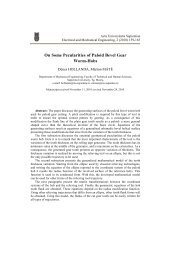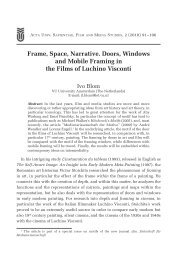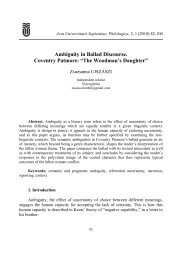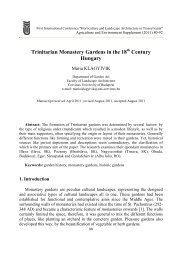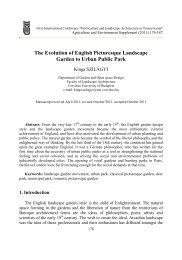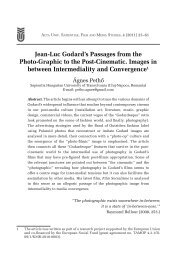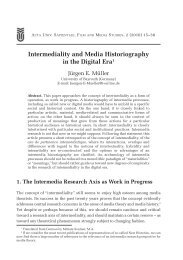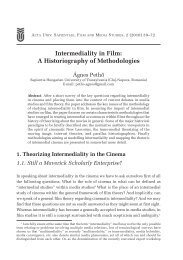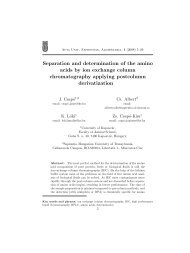From Grigore Moldovan to Moldován Gergely - Acta Universitatis ...
From Grigore Moldovan to Moldován Gergely - Acta Universitatis ...
From Grigore Moldovan to Moldován Gergely - Acta Universitatis ...
You also want an ePaper? Increase the reach of your titles
YUMPU automatically turns print PDFs into web optimized ePapers that Google loves.
<strong>Acta</strong> <strong>Universitatis</strong> Sapientiae, Philologica, 3, 2 (2011) 156-166<br />
<strong>From</strong> <strong>Grigore</strong> <strong>Moldovan</strong> <strong>to</strong> <strong>Moldován</strong> <strong>Gergely</strong><br />
A Career in Homeland<br />
Tímea BERKI<br />
Transylvania Trust Foundation, Cluj<br />
berkitimea@index.hu<br />
Abstract. Professor at Ferencz József University in Cluj, a problematic personality at<br />
the end of the 19 th century, <strong>Grigore</strong> <strong>Moldovan</strong> is canonised in the specialised literature of<br />
Romanian and Hungarian ethnology with a very valuable activity in this domain.<br />
The problem consists in the fact that neither the Romanian, nor the Hungarian<br />
community can accept without critique his identity defined in his works: he is a Romanian<br />
intellectual, citizen of the Hungarian state, and loyal <strong>to</strong> it. The paper presents and analyses<br />
<strong>Moldovan</strong>’s apolitical volume entitled Egy fürdőidény Borszéken (A Bathing Season in<br />
Borszék) written in 1883.<br />
The text written in Hungarian and signed with the Hungarian variant of the author’s<br />
name, presents an aesthetised identity that, nevertheless, keeps a continuous interest in<br />
trying <strong>to</strong> get acquainted with and understand the complex, contemporary interethnic<br />
relations of the author.<br />
The national identity in the modern conception of the same period has influenced the<br />
minority communities living in the Austro-Hungarian Monarchy, while the existing forms<br />
and possibilities of identification become problematic or inexplicable from the perspective<br />
of the end of the 19th century or even from the outlook of our days.<br />
The tension existing in the duality of <strong>Grigore</strong> <strong>Moldovan</strong>/<strong>Moldován</strong> <strong>Gergely</strong> can be<br />
resolved through the study of his intellectual career, of the conceptions and identifications<br />
of his personality. This study leads <strong>to</strong> the comprehension of how the problematic identities<br />
are functioning, as well as <strong>to</strong> the more particular observation of the weak points of the<br />
paradigm of modern national identity.<br />
156
<strong>From</strong> <strong>Grigore</strong> <strong>Moldovan</strong> <strong>to</strong> <strong>Moldován</strong> <strong>Gergely</strong><br />
Thus, the research on the literary, cultural relationships between two national cultures<br />
implies the evaluation of new possibilities in contac<strong>to</strong>logy, such as cultural anthropology,<br />
“his<strong>to</strong>ire croisée” and the theory of translation.<br />
Keywords: intellectual, Romanian-Hungarian, identity, the 19 th century, Transylvania<br />
In 1884 Miklós K. Papp, the typographer of the Magyar Polgár (Hungarian<br />
Citizen) newspaper in Kolozsvár edited a volume entitled Koszorú a román<br />
népköltészet virágaiból (A Wreath from the Flowers of Romanian Folk Poetry)<br />
containing Romanian folksongs translations by <strong>Gergely</strong> <strong>Moldován</strong>. <strong>Moldován</strong><br />
introduces his volume noting that the wild flowers translated by him differ from<br />
perfect gardening, but they have the unifying power of folk songs: the sentiments<br />
expressed by them unify the country girl with the lady, the common man with the<br />
lord, erasing social differences. 1 The activity of translation is interpreted here as a<br />
transmission between Romanian and Hungarian culture, but it also had the value of<br />
erasing cultural, social and national differences. This concept of translation is<br />
influenced by interests: it approximates the different communities and peoples by<br />
getting acquainted with artistic and cultural values of others. <strong>Moldován</strong> considers<br />
that the translation represents a double homogenisation: a social and a national one.<br />
This volume of translations is dedicated <strong>to</strong> Ilona Urmánczy from Maroshévíz<br />
(<strong>to</strong>day’s Topliţa) who, in <strong>Moldován</strong>’s view, represents the perfect example of<br />
affection for the people. The transla<strong>to</strong>r met this lady a year earlier – in 1883 –<br />
documented by another of his works that presents the memories of a summer spent<br />
at a spa. The introduction of the volume entitled Egy fürdőidény Borszéken (A<br />
Bathing Season in Borszék) specifies the intention of its author: it is not a scientific<br />
work, but it presents <strong>Moldován</strong>’s private feelings related <strong>to</strong> Borszék, a balneotherapeutic<br />
location. He also wants <strong>to</strong> promote this place where he spent his<br />
holidays. At first sight, therefore, it seems <strong>to</strong> be a literature of escape, but it is more<br />
than a light reading. Henceforth, this paper will analyse the intentions of the author,<br />
the possible readings of the text, an outline of the above-mentioned surplus of<br />
meanings and the presentation of those parts of the book that lead <strong>to</strong> the problem of<br />
identity, as well as Hungarian–Romanian cultural contacts.<br />
The text is written in the second person singular meant <strong>to</strong> refer <strong>to</strong> the reader.<br />
This perspective of narration and the fact that the text makes reference <strong>to</strong> real places,<br />
1 This articulation of the society is present also in <strong>Moldován</strong>’s political works. Ten years later he<br />
publishes his critiques related <strong>to</strong> the question of nationality in is volume “Magyarok, románok”<br />
(Hungarians, Romanians) and emphasizes the influence of the his<strong>to</strong>rical-juridical approach of the<br />
structured society on the Romanian community, presenting how this community is distributed in<strong>to</strong><br />
“intelligentsia” and peasantry. The work dealing with the Hungarian social his<strong>to</strong>ry of Gábor Gyáni<br />
and György Kövér defines this categorization as based on rank and prestige (Gyáni and Kövér 1998).<br />
157
158 T. Berki<br />
persons and dates authorise us <strong>to</strong> endue a value of documentation <strong>to</strong> the text and <strong>to</strong><br />
identify the narra<strong>to</strong>r with the author. So <strong>Moldován</strong>, the writer of this book, represents<br />
himself in an entertaining text, constructed and written after the experience.<br />
Travelling <strong>to</strong> Borszék and taking the waters represent a different time and<br />
place than the closed world of the city of Kolozsvár (Cluj). In this text, the leisure<br />
time is interpreted as spending a meaningful and refreshing time. Thus, the book<br />
could be considered as the narration of a trip, also emphasised by this quotation:<br />
“Travellers are more curious even than women. They want <strong>to</strong> know the his<strong>to</strong>ry of<br />
every single mound, they are interested in everything, becoming geologists,<br />
astronomers, botanists, zoologists, economists, or rather they’d prefer <strong>to</strong> become<br />
one if they could, as they are observing – and perceiving – things continuously, but<br />
they can’t explain them later.” (<strong>Moldován</strong> 1883: 10)<br />
Relying on his power of observation and perception, the traveller of the<br />
volume encounters – exactly as he steps out of his everyday life – his limits, e.g.<br />
that he cannot catch the world in its entirety, he has no <strong>to</strong>ols in comprehending the<br />
observed nature. This traveller’s curiosity luckily goes <strong>to</strong>gether with the folkloric<br />
interest mentioned before. <strong>Moldován</strong> enriches his travelogue with legends from<br />
Borszék and with his own collections: e.g. he inserts in<strong>to</strong> the text chapters called<br />
Egy rege a forrásról (A Tale about the Spring), Egy másik rege (Another Tale), Az<br />
erdő leánya (The Daughter of the Forest), A tündérkert (The Fairy Garden). He<br />
publishes data of local his<strong>to</strong>rical significance specifying its sources. Due <strong>to</strong> these<br />
the personal travelogue becomes a text written with scientific ambition.<br />
This scientific ambition is also shown by the fact that <strong>Moldován</strong> categorises<br />
and comments the notes made in the visi<strong>to</strong>rs’ book, such as: simple names without<br />
manu propria; lovers, melancholic, wise people, people with opinion, ones who<br />
attract attention <strong>to</strong> themselves, ones who make publicity, “revisors” and coward<br />
anonymous ones. Or he makes a statistical survey: as per domicile most of the<br />
visi<strong>to</strong>rs come from Marosvásárhely (Târgu Mureş), Gyergyó (Gheorgeni) and<br />
Kolozsvár, then from abroad, mainly from Iaşi and Bucharest. As per employment<br />
and occupation merchants (91), landowners (54), teachers (47), people from the<br />
private sec<strong>to</strong>r (20) are the most frequent visi<strong>to</strong>rs of the health-resort. As per<br />
gender: “In Borszék the feminine public is always greater in number than the male<br />
one”, and it includes those women and young ladies who “cannot be categorised<br />
according <strong>to</strong> their jobs, and who form a distinct group in an era that is not<br />
acquainted with emancipation.” (<strong>Moldován</strong> 1883: 124)<br />
The Hungarian – Romanian relationship appears several times throughout the<br />
volume. The Romanians are shown in the surroundings of the Kossuth-well, where<br />
the bathers mingle with the <strong>to</strong>urists in a linguistic variety. Though they are isolated<br />
in this cavalcade as a separate group, they discuss politics in Romanian. Yet, their<br />
connection is relative, for example, the narra<strong>to</strong>r draws attention <strong>to</strong> the different<br />
ways of thinking of the Romanians living in Iaşi and in Bucharest.
<strong>From</strong> <strong>Grigore</strong> <strong>Moldovan</strong> <strong>to</strong> <strong>Moldován</strong> <strong>Gergely</strong><br />
The connection between the Romanian and Hungarian nation is illustrated by<br />
the relationship between Marie Cantacuzine [!] and Ilona Huszár. The presentation<br />
of the Romanian girl is a good opportunity for the narra<strong>to</strong>r <strong>to</strong> write about the<br />
Romanians, <strong>to</strong>o. Ilona Huszár “has made a conquest of a soul and thus she met her<br />
patriotic obligations” (<strong>Moldován</strong> 1883: 154), since Marie learnt Hungarian from<br />
her and thanks <strong>to</strong> her, she played Hungarian folk song on the piano.<br />
This example shows both the fact that education makes people receptive and<br />
that this could be even a patriotic action. In this case the language acquisition, the<br />
interest <strong>to</strong>wards the other culture seems <strong>to</strong> be one-sided and ideological. The<br />
relationship between the two women works as a pattern, in spite of the fact that,<br />
according <strong>to</strong> <strong>Moldován</strong>, one of the causes of the disagreement between nations can<br />
be found in women. Here is a longer quotation from the work:<br />
… natural scientists can by no means determine either the time that bred and<br />
gave birth <strong>to</strong> the German, the Romanian, the Hungarian and the Jew, or the<br />
time that baked – as if they were pies made of an excellent material – the<br />
baron, the count, the prince, the plebs, the well-off citizen and the s<strong>to</strong>ckingwearing<br />
peasant. They can only determine the time when man came in<strong>to</strong><br />
being in a wild state, stick in hand, naked, orphan and abandoned. [...] even at<br />
the health-resort there are high dividing walls between one man and another,<br />
one family and another, one race and another. [...] Women make the<br />
difference in a society, by job, birth and rank every class raises for itself<br />
crotchets and it lives according <strong>to</strong> them.” 2 (<strong>Moldován</strong> 1883: 138-139)<br />
He specifically outlines the his<strong>to</strong>ry of the origin of mankind (or only of the<br />
Transylvanian nationalities?), according <strong>to</strong> which people are equal by birth,<br />
however, their education, socialisation, as well as their social life make them<br />
different. Women are the guarantee of life, but only in the family. Men remain the<br />
main ac<strong>to</strong>rs of social life being active participants in communal events, from which<br />
women stay away.<br />
Lujza Blaha, the famous Hungarian actress, who spends her holiday in<br />
Borszék, displays a different female attitude becoming the symbol of approach, 3<br />
since her appearances attract very different bathing public <strong>to</strong> events of<br />
2 The author’s translation.<br />
3 The Ministry of Religion and Public Instruction establishes the Lujza Blaha Foundation from the<br />
income of these occasions, and its interest “should be appropriate <strong>to</strong> support two poor, but good students<br />
without religious and ethnical differences”. We can make out from the text another important element: a<br />
cultic approach <strong>to</strong> Lujza Blaha. I quote from the narra<strong>to</strong>r’s confessions: “I noted down on the actress’s<br />
fan: Should Borszék be able <strong>to</strong> carry a hundred times more, /That it carries al<strong>to</strong>gether, / Because you are<br />
an idol of the people, / You are now its most precious pearl.” [emphasis is mine – T. B.] (See: <strong>Moldován</strong><br />
1883: 64-65)<br />
159
160 T. Berki<br />
entertainment such as the ball, the banquet and the <strong>to</strong>rchlight music event<br />
organised by the Mulató-klub (The Club of Amusements).<br />
Bathing as a recreation connected <strong>to</strong> the preservation of health 4 is also<br />
favourable <strong>to</strong> social life – beside travelling or excursions. For example, love,<br />
choosing a partner or the possibility of a future marriage, that are present in several<br />
cases throughout the text, turns the weeks spent in Borszék in<strong>to</strong> a pleasant dream,<br />
that is beyond reality.<br />
At the beginning of August our narra<strong>to</strong>r and his company make an excursion<br />
<strong>to</strong> Moldova. There are thirteen people, including Lujza Blaha and her husband,<br />
Ödön Splényi. In connection with the excursion <strong>Moldován</strong>’s emotions come <strong>to</strong> the<br />
front: “my heart sank on this bridge [at the frontier, at Tölgyes they needed a<br />
“passus” – addition by myself, B. T.]. I don’t know how others felt when crossing<br />
the frontier, but it made me upset. As if something whispered <strong>to</strong> me: ‘Don’t go<br />
away, stay here!’ Though the whole excursion was a joke and I knew that we<br />
turned back in a few minutes, yet something pulled me down <strong>to</strong> the ground so I<br />
could kiss it before I crossed it.” (<strong>Moldován</strong> 1883: 68)<br />
These plastic gestures (kissing the mother earth and emphasising the shortness<br />
of the journey) show adherence <strong>to</strong> the homeland, while the crossing of the border<br />
and leaving of the country suggest the idea of strangeness and homelessness in this<br />
context. With this gesture the narra<strong>to</strong>r expresses his belonging and loyalty <strong>to</strong><br />
Hungary, his native land. Owing <strong>to</strong> Lujza Blaha’s indisposition, the journey is even<br />
shorter. After crossing the border <strong>to</strong> Moldova <strong>Moldován</strong> becomes embarrassed,<br />
Lujza Blaha gets ill. At this point, even if only implicitly, the text states that the<br />
space outside the country, stepping on<strong>to</strong> the foreign land could be unsettling.<br />
Where does this strangeness come from? Geographically Moldova is only the<br />
neighbouring country, while linguistically the travellers experience the fact that the<br />
Romanian soldiers working at the frontier speak only Romanian.<br />
If the readers of the writer’s age, or even you, do not have any information<br />
regarding <strong>Moldovan</strong>’s origin, based on the author’s name (<strong>Gergely</strong> <strong>Moldován</strong>), one<br />
could think him without any problem <strong>to</strong> be a Hungarian and his gesture could be<br />
natural.<br />
Now I can reveal <strong>to</strong> you that <strong>Gergely</strong> <strong>Moldován</strong> is an intellectual with<br />
Hungarian, or, <strong>to</strong> be more precise, with Transylvanian Romanian origin. Does this<br />
information change anything in the judgment of <strong>Moldován</strong>’s text?<br />
If we look at <strong>Moldován</strong>, the <strong>to</strong>urist from a national point of view, who would<br />
kiss the earth of his country before crossing it, his relation <strong>to</strong> the Romanian ground<br />
4 In the chapter entitled Our cure, with reference <strong>to</strong> the medical prescription the narra<strong>to</strong>r mentions the<br />
tasks related <strong>to</strong> spending time slowly and peacefully (allowing a long time for accommodation, not<br />
thinking, concentrating on the things that we have seen, finding a company), and thus the bathers can<br />
regain their strength in six weeks. For differentiating leisure time, or more generally, the notion of<br />
time see Gellériné 1991.
<strong>From</strong> <strong>Grigore</strong> <strong>Moldovan</strong> <strong>to</strong> <strong>Moldován</strong> <strong>Gergely</strong><br />
is contradic<strong>to</strong>ry with his Romanian origin and meaningful name that indicates his<br />
origin (Moldova). According <strong>to</strong> our prejudices, we would have expected him <strong>to</strong> be<br />
happy when crossing the Hungarian border. Similarly we found his gesture strange,<br />
contradic<strong>to</strong>ry also from a national point of view. However, this gesture might have<br />
been natural in those times. Therefore, my paper continues with the discussion of<br />
the relationship of different ethnic groups at the end of the 19 th century.<br />
With reference <strong>to</strong> the excursion <strong>to</strong> Moldova, <strong>Moldován</strong> mentions the beautiful<br />
girls, the Romanian dance that he admired, as well as the event of buying<br />
Moldavian cheese and expensive sweets while Lujza Blaha was spending a quarter<br />
of an hour there. We can say that he also thinks stereotypically, and this appears<br />
also when mentioning other nationalities, but not at all with that emphasis: e.g. the<br />
Gypsies are musicians, the Jews are cheerful.<br />
I have not mentioned the Hungarians here because it is obvious that <strong>Moldovan</strong><br />
identifies himself with their perspective, and beside this, he relates his bathing<br />
experiences in Hungarian and he quotes Hungarian sources in relation with Borszék.<br />
The <strong>Gergely</strong> <strong>Moldován</strong> who writes his travelogue shows himself in the<br />
company of Hungarians, whilst he is paying attention <strong>to</strong> the Hungarian and<br />
Romanian relationships and differences. If we try <strong>to</strong> differentiate from a national<br />
point of view, we get in a pitfall, since – as we have already seen and as I would<br />
bring additional arguments <strong>to</strong> it – the modern concepts of “ethnic identity” and<br />
“nationality” are less suitable for the description of <strong>Moldovan</strong>’s intellectual<br />
identity. However, these points of reference and categorisation can help us<br />
understand <strong>Moldovan</strong>’s thinking from the other perspective.<br />
If the travelogue about Borszék is the space of private emotions, it can be seen<br />
that for the male <strong>Gergely</strong> <strong>Moldován</strong> not only female beauty gives reason <strong>to</strong> express<br />
these feelings, but the problem of the relation between language, culture and<br />
nationality is also ranked among the emotions of personal life, as well as others’<br />
social life.<br />
We know that he frankly assumed that he was a Romanian citizen from<br />
Hungary, though in this work he wrote about the Romanians in such a way that he<br />
covered his own affection for this ethnic group. He can see this ethnic group in a<br />
differentiated way, simultaneously as an outsider and as a “native”, and, compared <strong>to</strong><br />
this, he sees the Hungarians as a homogenous group. Thus, we can ask by right: who<br />
was the person who published his Hungarian texts as <strong>Gergely</strong> <strong>Moldován</strong> from the<br />
beginning of the last third of the 19 th century. In what way is <strong>Moldovan</strong> a Romanian?<br />
Or, if he admits <strong>to</strong> be a Hungarian, then how is he related <strong>to</strong> this ethnic group?<br />
I am looking for the answers <strong>to</strong> these questions, because <strong>Moldovan</strong>’s peculiar<br />
awareness of self-identity, as well as his works related <strong>to</strong> this, keep him away from<br />
national cultures, in the modern sense of the word. Already in his life he was<br />
characterised with negative, condemning attributes (“renegade, disinherited”), later<br />
161
162 T. Berki<br />
he was called “contradic<strong>to</strong>ry” or “the Győző Hajdú of Romanian literature”, thus<br />
declining the possibility of any deeper analysis or interpretation.<br />
Throughout my research I tried <strong>to</strong> understand <strong>Moldován</strong>’s scholarly activities,<br />
his decisions that seem <strong>to</strong> have political colouring (since he was in conflict with the<br />
Romanian public opinion). Nevertheless, both Romanian and Hungarian ethnology<br />
considers them valuable – based on professional arguments. I am recalling the<br />
formation of <strong>Moldován</strong>’s career and some of its moments, in order that one can see<br />
how much the national identity at the end of the 19 th century is not obvious, and<br />
that the idea of the nation state involves difficult problems and results in peculiar<br />
interpretations on the level of individual identities.<br />
We know that <strong>Moldovan</strong> studied in Szamosújvár (Gherla) for a short period.<br />
Coming <strong>to</strong> Kolozsvár, he graduated at the Piarists, and, after obtaining a degree in<br />
law, he found his first job in this city. The Piarist high school education has a great<br />
importance from the point of view of the Romanians from Transylvania: as an<br />
institution promoting further education of poor children and giving them even<br />
financial assistance, due <strong>to</strong> charitable people, it attracts the Transylvanian Greek<br />
Orthodox and Greek Catholic pupils. Charity was not determined by reason of<br />
ethnicity, but by denominational and social considerations, as well as by the<br />
ideology of the Piarist order maintaining the institution. <strong>From</strong> the beginning of the<br />
18 th century, a full range of Romanian generations emerges from this institution,<br />
playing an important role in the formation of their own culture (Bíró 1926: 18-39).<br />
In 1926 the institution was celebrating the 150 th anniversary of the school<br />
publishing a volume entitled Öreg diák visszanéz (The Old Boy Is Looking Back)<br />
(György 1926). The volume presents illustrious teachers and former pupils, old<br />
boys remember their school. Among the texts of Péter Apor, baron Miklós Jósika,<br />
dr. Péter Erődi-Harrach, Miklós Torma and dr. Benedek Jancsó, Aladár Kuncz and<br />
others one may find the writing of Dr. <strong>Gergely</strong> <strong>Moldován</strong>, namely <strong>Grigore</strong><br />
<strong>Moldovan</strong>, entitled A piaristák melegében (In the Warmth of the Piarists)<br />
(<strong>Moldován</strong> 1926).<br />
When analysing the memoirs from 1926 of the now eighty-year-old<br />
<strong>Moldovan</strong>, I deal with the lines of an intellectual living in Romania after the First<br />
World War. He writes: “I almost wonder: how was it possible that despite the<br />
seven years in Szamosújvár and nine years in Kolozsvár, al<strong>to</strong>gether sixteen years’<br />
of impact of the Hungarian culture I started my career as a Romanian writer?<br />
Where did I get the ability for this, what preserved the national feeling, the<br />
Romanian ‘me’ in myself, in order <strong>to</strong> realise the knowledge acquired from<br />
Hungarians for the advantage of my race? I would like <strong>to</strong> give an answer <strong>to</strong> this<br />
question now, since I watch the anniversary of the Piarists with grateful feelings.”<br />
<strong>Moldovan</strong> could rarely experience being close <strong>to</strong> his teachers, for example, in<br />
the refec<strong>to</strong>ry, replacing one of his supported colleagues. The text repeats the<br />
syntagm twice: “the Piarists were those who made me a man”. Then he also gives
<strong>From</strong> <strong>Grigore</strong> <strong>Moldovan</strong> <strong>to</strong> <strong>Moldován</strong> <strong>Gergely</strong><br />
us the explanation: he thanks them for his way from satisfac<strong>to</strong>ry <strong>to</strong> excellent<br />
grades. Thus, <strong>Moldovan</strong>’s life and career covers a clear developmental path, being<br />
a school-inspec<strong>to</strong>r, then a university professor, a dean and rec<strong>to</strong>r magnificus.<br />
According <strong>to</strong> his memoirs, the Romanian pupils attended the institution and<br />
were present in its organisations, but beside these, they were active in their own<br />
school literary and debating society, they sang at the services of the Romanian<br />
church. He was a Romanian writer during his school years in one company with<br />
Alexandru Radu and Ioan S. Bădescu. He mentions their career after school: Radu<br />
became a teacher, the edi<strong>to</strong>r of the periodical called Dacia in Romania, while<br />
Bădescu became a poet, edi<strong>to</strong>r, school-inspec<strong>to</strong>r also in Romania. By 1926 both of<br />
them had already died. Compared <strong>to</strong> them, <strong>Moldovan</strong> did not emigrate <strong>to</strong> Romania,<br />
but he stayed in Hungary and – according <strong>to</strong> his interpretation – he became a loyal<br />
citizen of his country.<br />
The closing thoughts of his memoirs are also noteworthy: “the rise from the<br />
goose-herd, from the little shepherd <strong>to</strong> the rec<strong>to</strong>r’s chair was by all means a<br />
beautiful rise. The way, the direction was shown <strong>to</strong> me by the Piarist fathers. In<br />
1908 I established a foundation with 500 crowns for the literary and debating<br />
society of the school <strong>to</strong> award a valuable literary paper, in the memory of my son,<br />
István. For this, I wanted <strong>to</strong> express my gratitude <strong>to</strong> those people who had behaved<br />
like my father. I raise my hat in front of the Piarist order, the Piarist fathers, and I<br />
feel extremely happy that I could express once again my gratitude at their jubilee.”<br />
(<strong>Moldovan</strong> 1926: 92)<br />
<strong>Moldovan</strong>, who takes advantage of the different opportunities <strong>to</strong> give thanks,<br />
not only financially but also symbolically, wants <strong>to</strong> return the kindness <strong>to</strong>wards<br />
him, but with this gesture he seemingly shows himself in the role of those who<br />
helped him once: he would support the pupils’ literary attempts with his own<br />
foundation. He mentions his charity, plastically illustrates his rising career, and he<br />
emphasises the importance of the Piarist institution from the point of view of his<br />
own career.<br />
Getting out of there, he is not attached <strong>to</strong> the Romanian community of the<br />
literary and debating society, but, as a Hungarian author, he has active positions in<br />
Hungarian state institutions. Taking maximal advantage of the citizen’s rights and<br />
opportunities his career turns in<strong>to</strong> a s<strong>to</strong>ry of success that has an enormous<br />
importance upon him. At least, his memoirs convince us of this.<br />
After his father’s death, as well as while studying law in Kolozsvár, his<br />
education is made possible by church foundations (or foundations in the possession<br />
of the church), and this assumes a stronger denominational affection. When<br />
<strong>Moldovan</strong> emphasises his Romanian nationality, he does not refer <strong>to</strong> the modern<br />
conception of nation. This component of his identity might be legitimised only by<br />
his denominational affection, as well as the presence of Romanian culture and<br />
politics as regular <strong>to</strong>pics in his Hungarian works.<br />
163
164 T. Berki<br />
The question is also worth seeing from the point of view of his family’s<br />
his<strong>to</strong>ry. <strong>Moldovan</strong> had only one son, István. He was born on 15 August, 1871, in<br />
Kolozsvár, (Szinnyei 1893-1914), 5 studied law in Graz, Geneva and Kolozsvár, in<br />
1894 he <strong>to</strong>ok his doc<strong>to</strong>r’s degree, while in 1896 he <strong>to</strong>ok his diploma as a lawyer in<br />
Budapest and in 1897 he opened a lawyer’s office there. At the same time, he<br />
became cattle overseer of his lordships, Count György Bánffy (1845?–1929) and<br />
the family’s legal adviser.<br />
The young <strong>Moldovan</strong>’s career was formed similarly <strong>to</strong> his father’s, though<br />
under different circumstances. He had the chance <strong>to</strong> continue university studies<br />
abroad, which was a great gap in his father’s education. His doc<strong>to</strong>r’s title was not<br />
only honorary, but a degree obtained in a specialisation. He was also a lawyer,<br />
following the steps of his father, but he kept <strong>to</strong> his chosen profession. We find him<br />
in the service of the Bánffys’ even at the beginning of the 20 th century. In 1907 the<br />
father spends Christmas at his son in Bánffyhunyad (Huedin) where the younger<br />
<strong>Moldovan</strong>’s lawyer’s office is. He died in 1908.<br />
I have mentioned before that the younger <strong>Moldovan</strong> studies at the university of<br />
Graz at the time of the Monarchy, and he registers at the university’s register in this<br />
way: “<strong>Moldovan</strong> Stephan (<strong>Moldován</strong>), nationality: ung., age: 18, place of origin:<br />
Klausenburg [the German name of Cluj], religion: römisch-ka<strong>to</strong>lisch [Roman<br />
Catholic], father’s profession: univ. prof., entering 1889 W, leaving 1890 S, faculty:<br />
Jurist.” <strong>From</strong> our point of view, this list of data has several interesting aspects.<br />
The rectification of his name in parentheses, the national identification is<br />
aimed <strong>to</strong> legitimise that the student was Hungarian. The fact that in the register at<br />
the religion section appears “Roman Catholic” and not “Greek Catholic”<br />
(disregarding the possibility of a mistake/clerical error) can be meaningful from his<br />
father’s perspective: it may have happened that the father had his son baptised not<br />
as a Greek Catholic – which indicates his ethnical affiliation, (<strong>to</strong>o) – but as a<br />
Roman Catholic, which is an over-represented denomination in Hungary.<br />
Thus, it is more convincing if one mentions the father as <strong>Gergely</strong> <strong>Moldován</strong><br />
rather than <strong>Grigore</strong> <strong>Moldovan</strong>. On the one hand, this was the practice in Hungary at<br />
the end of the 19 th and at the beginning of the 20 th century, e.g. in the case of<br />
Vulkánu József, Eminescu Mihai or Verne Gyula. On the other hand, there were<br />
also Hungarian citizens in the country whose ethnical identity differs from the<br />
national one, and they have a certain kind of attitude <strong>to</strong> this situation. The<br />
Romanians, the Saxons, the Slovaks, etc. got <strong>to</strong> a difficult situation at the time<br />
when the nation state came in<strong>to</strong> being, since according <strong>to</strong> the official Hungarian<br />
concept of nation the mother <strong>to</strong>ngue and the culture that uses it became one of the<br />
crucial criteria of affiliation.<br />
5<br />
At this time <strong>Grigore</strong> <strong>Moldovan</strong> was a law student, since he had graduated in 1872 and became a<br />
lawyer in Kolozsvár.
<strong>From</strong> <strong>Grigore</strong> <strong>Moldovan</strong> <strong>to</strong> <strong>Moldován</strong> <strong>Gergely</strong><br />
Thus, <strong>Moldován</strong> sees himself as a Hungarian writer; he has good relations<br />
with the Hungarian intellectuals from Kolozsvár and from Hungary but<br />
problematic ties <strong>to</strong> the Romanians. However, his case cannot be seen as a change<br />
of nationality. We cannot speak about assimilation in the case of <strong>Moldován</strong> since<br />
he is persistent <strong>to</strong> the utmost in asserting that he is a Romanian. However, his son’s<br />
identity in the university registration highlights a process of assimilation.<br />
According <strong>to</strong> <strong>Moldovan</strong>’s family his<strong>to</strong>ry, we have seen that the Greek Catholic<br />
Romanian grandfather has a Greek Catholic Romanian-Hungarian son, who has a<br />
Roman Catholic Hungarian son. The changes take place on the male line, but<br />
surely these are not indifferent from the viewpoint of the family’s female members.<br />
Thus, the change of nationality or the assimilation takes place in István<br />
<strong>Moldován</strong>’s case.<br />
<strong>Gergely</strong> <strong>Moldován</strong> was judged mainly by those who profess extremist<br />
political theories (Onisifor Ghibu, Ioan Slavici). He is not the only Hungarian<br />
citizen with Romanian origin in the second half of the 19 th century who forms and<br />
later makes good use of his knowledge of Hungarian and his Hungarian net of<br />
relations in Hungarian state institutions. Here we can think of Iosif Vulcan who<br />
edits his periodical called Familia in Budapest and Nagyvárad (Oradea), or of<br />
Emanuil Gojdu/Gozsdu Manó, who is also problematic regarding his identity, and<br />
who is also condemned by his contemporaries just like <strong>Moldován</strong>. However, he<br />
could become a positive figure since with his fortune and foundation he sponsored<br />
the education of more than a hundred Romanian students.<br />
<strong>Moldován</strong>’s work starts from Romanian publications, and through Hungarian<br />
translations of Romanian folk literature and a Hungarian overview of Romanian<br />
literature and popular culture it arrives at exclusively Hungarian literary texts that<br />
thematically are always connected <strong>to</strong> Romanian culture. I think it is not practicable<br />
if one puts aside or condemns the work of life of <strong>Moldován</strong> and of the intellectuals<br />
similar <strong>to</strong> him. Interpreting his literary achievements, the ideas hiding in these, the<br />
motivations and interests moving his career are much more important since they<br />
take us closer <strong>to</strong> the consciousness of the self-identity that is difficult <strong>to</strong><br />
understand. On the other hand, they can explain <strong>to</strong> us that what we now call a<br />
hybrid identity could be even natural at the end of the 19 th century in Hungary,<br />
where in 1896 the millennial existence of the independent nation state was<br />
celebrated, though <strong>Moldován</strong>’s homeland politically belonged <strong>to</strong> a dualistic<br />
regime, the Austro-Hungarian Monarchy.<br />
The undecidedness of the <strong>Moldovan</strong>/<strong>Moldován</strong> question, understanding the<br />
identification gestures of the intellectual with Hungarian citizenship and Romanian<br />
origin requires further analyses that could start a new series of research in<br />
relationship his<strong>to</strong>ry. As I have shown earlier, the Romanian-Hungarian attributes<br />
that in my paper are defined as features of intercultural connections, in the 19 th<br />
century were less suitable for unambiguous identification, the more so since this<br />
165
166 T. Berki<br />
field of science was part of a process of institutionalisation in the 20 th century<br />
called relationship his<strong>to</strong>ry, contac<strong>to</strong>logy or comparatistics. However, this question<br />
should be the <strong>to</strong>pic of another paper.<br />
References<br />
Bíró Vencel. 1926. A kolozsvári római-ka<strong>to</strong>likus főgimnázium története. [The His<strong>to</strong>ry<br />
of the Roman-Catholic Secondary School in Kolozsvár]. In dr. Lajos György<br />
(ed.), Öreg diák visszanéz [The Old Boy Is Looking Back], 18–39. Cluj-<br />
Kolozsvár: edited by the Alumni of Roman-Catholic Gymnasia from Cluj,<br />
Minerva.<br />
Gellériné Lázár, Márta. 1991. Időben élni. Történeti-szociológiai tanulmányok.<br />
[Living in Time. Studies on His<strong>to</strong>ry and Sociology]. Budapest: Akadémiai Kiadó.<br />
Gyáni, Gábor and Kövér, György. 1998. Magyarország társadalomtörténete a<br />
reformkortól a második világháborúig. [The Social His<strong>to</strong>ry of Hungary from the<br />
Reform Period <strong>to</strong> World War Two]. Budapest: Osiris.<br />
<strong>Moldován</strong>, <strong>Gergely</strong>. 1883. Egy fürdőidény Borszéken. [A Bathing Season in Borszék].<br />
Kolozsvár: Magyar Polgár.<br />
<strong>Moldován</strong>, <strong>Gergely</strong>. 1926. A piaristák melegében. [In the Warmth of the Piarists].<br />
[http://mek.oszk.hu/07500/07523/html/02.htm]<br />
Szinnyei, József. 1894-1913. Magyar írók élete és munkái I-XIV. [The Life and Works<br />
of Hungarian Writers I-XIV]. Budapest: Hornyánszky.<br />
Varga, Júlia. 2000. A Kolozsvári Királyi Líceum hallgatósága 1784-1848. [The<br />
Audience of the Royal Secondary School in Kolozsvár 1784-1848]. Budapest:<br />
ELTE Egyetemi Levéltár.



